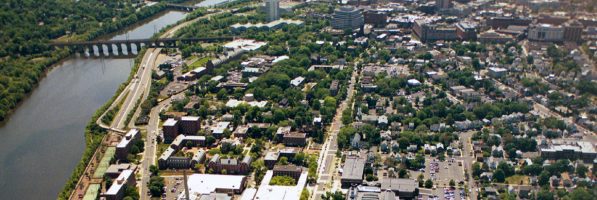Best Real Estate MBAs in the Mid-Atlantic Region

After World War II, a housing boom created a demand for real estate business expertise. Decades later, demand only increased in the wake of the 2008 financial crisis. Now with unprecedented levels of international real estate investment at play, demand for this specialization has reached a fevered pitch.
This rings particularly true for investments in the Mid-Atlantic region where many top real estate MBA programs are headquartered.
Best Mid-Atlantic Real Estate MBAs

Located in Charlottesville, UVA’s Darden Graduate School of Business consistently ranks among the top MBA programs nationally. In addition to Darden’s Real Estate specialization, the Real Estate Club offers alumni connections, internship info sessions, ARGUS training, LEED certification study sessions, and “case competition preparatory sessions.”
The Real Estate Club also participates in the Darden Finance Conference, offering participants the chance to connect with real estate executives in the financial sector. UVA offers in-state tuition of $94,524, $97,524 for non-residents, and $98,796 for international students. Ninety percent of graduates are employed after graduation with a median base salary reported at $125,000.

One out of 10 UNC Kenan-Flagler Business School MBAs complete the school’s Real Estate Concentration, making it one of the largest programs of its kind in the nation. Real Estate MBA students choose from development and/or finance/investments tracks. Here are just a few of the available courses:
- Argus Certification Training
- Financing Real Estate in Today’s Capital Markets
- International Real Estate Investment
- Real Estate Law
- Real Estate Macroeconomics
- Securities Markets
Kenan-Flagler tuition is a hefty $132,648 but the average starting salary is reported at $116,543 with 11 percent of placements in Real Estate.

Founded in 2005, the George Washington School of Business Center for Real Estate and Urban Analysis (CREUA) strives to offer a high-caliber real estate curriculum to both GW graduate and undergraduate students. The Center also conducts real estate research on “walkable urban place development and management,” for which a graduate certificate is offered to MBAs. Tuition at GW is $105,700 and the average starting salary is $96,000.

The University of Maryland at College Park was among the first schools to offer the MRED degree. At UMD Smith, MBA candidates have the option to pursue an MBA/MRED dual degree. Dual degree candidates can expect to begin their studies with MBA coursework and then cross over to MRED focus as the program progresses.
Full-time MBA students can expect to pay $44,766 per year for in-state tuition, while out-of-state students can expect to pay $53,946. Smith reports that 95 percent of its graduates are employed within six months of graduation with an average salary of $114,845.

Georgetown University’s McDonough School of Business is home to Steers Center for Global Real Estate, which aims to provide its MBA students an “industry-grade education that produces students who are uniquely competitive in the global real estate job market.”
The Center’s major selling points are its diversified Four Quadrant curriculum model, immersion in the Washington DC market, and the Real Estate Clinic.
Tuition is $59,700, with an average salary of $116,946 and 98 percent percent of employment-seeking students receiving a job offer within three months of graduation.
Best Real Estate MBAs in the Northeast

While a career in real estate is not one of the most popular options for MBA graduates, it is a solid choice. The U.S. real estate industry pulls in over $166 billion in revenue each year, and markets in India, China, and other emerging economies are poised to expand. So, the question is, if you’re looking to go to school in the Northeast, where are the best MBA programs to help build a career in the industry? We’ve highlighted five of our favorite Northeast real estate programs below.
The Best Northeast Real Estate MBA Programs

The NYU Stern School of Business offers full-time MBA students a chance to specialize in real estate. According to the school, it “provides rigorous training in the development, investment, and financing of real estate projects.” Students who choose the specializing are taught to think strategically about real estate in primary and secondary markets including the legal, taxation, and regulatory environments they’ll encounter.
Real estate MBA curriculum includes classes such as:
- Real Estate Development and Entrepreneurship
- Real Estate Transactions
- Real Estate Investment Strategies
- Urban Systems
Real Estate Outside the Classroom:
- Center of Real Estate Finance: Established in 2012, the Center is dedicated to expanding the School’s course offerings and career services in real estate. It’s open to both MBAs and undergraduates alike and offers monthly events, research and more.
- MBA Real Estate Club: The Stern Real Estate Club (SREC) offers guest lectures, panel discussions, mixers, site visits, and case competitions for MBA students interested in expanding their real estate experience and insight.

The Georgetown University McDonough School of Business also offers a specialization in real estate for MBA students, which can include an intensive learning experience (ILE) in real estate development. ILEs are elective courses that offer client-centered work and experiential learning opportunity off campus in a concentrated time format.
MBA students interested in real estate can take courses in:
- Real Estate Private/Public Equity
- Real Estate Private/Public Debt
- Negotiations
- Fixed Income Analysis
Real Estate Outside the Classroom
- Steer Center for Global Real Estate: The Steers Center “offers students unparalleled access to the real estate industry at a global level.” Students gain hands-on experience with the D.C. real estate market through a range of activities from alumni mentoring to internships, job contacts, and more.
- Real Estate Industry Career Coach: Georgetown offers a career coach with specific industry knowledge and relationships in real estate. This career coach will help MBA students with their resume, cover letter, mock interviews, and networking strategy.

At The Wharton School, MBA students can major in real estate. This major includes two required courses in real estate investment and real estate development. The goal of the major is to “prepare students to be leaders in the real estate industry” and provide the necessary quantitative and qualitative tools to be successful. Offered since 1985, the major has grown in scope and size over the years.
Additional courses in real estate that Wharton MBA students can enjoy:
- Global Real Estate: Risk, Politics, and Culture
- Urban Real Estate Economics
- Real Estate Law
- Real Estate Entrepreneurship
Real Estate Outside the Classroom
- Samuel Zell & Robert Lurie Real Estate Center: Each year, the Real Estate Center sponsors conferences, seminars, and special programs for students and faculty interested in real estate. Established in 1983, it promotes excellence in real estate education and research.
- Wharton Real Estate Club: The Wharton Real Estate Club provides career development, mentorship, and networking opportunities for students at Wharton. Of particular note are the treks and tours that allow students to meet prospective employers, visit project sites, and gain first-hand experience.

The Columbia Business School’s MBA Real Estate program “provides students an unparalleled opportunity to expand their entrepreneurial skills while focusing on real estate finance and investment management.”
The program encourages students to view real estate as both a physical and financial product by emphasizing a blend of theory and practice. Throughout the curriculum, students work on 65-plus proprietary real estate business cases taught by real estate professionals.
The real estate curriculum differs every term, but it includes courses such as:
- Real Estate Finance
- Real Estate Transactions
- Real Estate Portfolio Management
- Social Impact Real Estate Investing and Development
Real Estate Outside the Classroom
- Paul Milstein Center for Real Estate: The Center for Real Estate integrates the theoretical and practical knowledge of real estate. It offers regularly hosted events including panel discussions, conferences, alumni career breakfasts, and symposiums
- Fellowships & Scholarships: Uniquely, Columbia offers multiple fellowships and scholarships for MBA students interested in real estate. Awards can be as much as $50,000 a year and are both merit-based and need-based.

Full-time MBA students at the Rutgers Business School can customize their education with a real estate concentration. In total, students who choose this path will take six courses in real estate including strategic management. They can also pursue a dual concentration in finance and real estate, which requires them to take a course in aggregate economic analysis.
Other potential real estate courses that MBA students can take, include:
- Real Estate Finance
- Real Estate Capital Markets
- Market Analysis and Valuation
- Property Management and Real Estate Investment Management
Real Estate Outside the Classroom
- Center for Real Estate: The Rutgers Center for Real Estate is a dynamic hub for students, academics, and professionals. It aims to educate, research, and exchange ideas on real estate. Currently, more than 95 real estate professionals lend their influence to the Center.
- Rutgers Real Estate Club: The Club is a “place for people interested in real estate, internships, and everything business. It brings together experienced speakers for a variety of events and opportunities.
What are the Best Real Estate MBAs in Boston?

Despite episodic waves of unrest, real estate is a worthy investment. More importantly, real estate is a cornerstone of the world economy. The importance of understanding the intricacies and nuances of this complex field cannot be overstated.
In Forbes, Yolanda Barnes, who runs Savills World Research, said, “real estate is the pre-eminent asset class which will be most impacted by global monetary conditions and investment activity and which, in turn, has the power to most impact national and international economies.” For the B-school-bound, becoming fluent in real estate’s many facets can provide a valuable edge in nearly every area of business.
Below, we’ve laid out the best Boston real estate MBA options for those looking for careers in the industry.
Harvard Business School
It would be remiss to talk about business education in Boston without mentioning Harvard Business School. HBS is easily one of the most reputable business schools in the world. Forbes places the university in its top three “Best Business Schools.” For those pursuing real estate, Harvard MBA’s have access to the Harvard Business School Real Estate Club, which provides its members with opportunities for supplemental real estate education, training, and extensive networking. Harvard also hosts an annual Real Estate Weekend, wherein students can buy tickets to attend development workshops and fireside chats with industry experts.
F.W. Olin Graduate School of Business – Babson College
At Babson College’s F.W. Olin Graduate School of Business, MBA students can pursue the finance concentration, which offers several courses in real estate. Students can rake courses like Real Estate Financial Modeling, Real Estate Fundamentals, or Real Estate Development. According to recent Olin graduate employment statistics, 10 percent of the 2017 MBA class landed jobs in real estate. This number may not seem overwhelming, but it dwarfs the percentage seen in many MBA programs (usually about two to three percent).
Sloan School of Management – MIT
MIT’s Sloan School of Management offers an MBA that incorporates real estate education. Though the school also offers an MS in real estate development (MSRED) for those more focused on earning a degree in real estate than an MBA, the MBA finance track offers a different set of advantages. This track zooms in on the finance-related areas of real estate, such as investment, urban economics, and housing economics. The MBA real estate courses zero in on the financial component of the industry and the core MBA courses also help students build a broad foundation in business. MBA students pursuing a certificate in finance can take courses like Real Estate Finance and Investment and Real Estate Capital Markets.
The MBA Real Estate Boom: Inside The Schulich Real Estate Program

Real estate is booming. In fact, according to the Financial Times, commercial property asset values and investment yields have surpassed levels prior to the Great Recession, and there is continued strong demand for offices, urban apartments, and more. It’s all thanks to continued low interest rates and tight supply.
What has this real estate boom meant for business schools? It’s meant a decrease in interest in banking and an increase in interest for real estate study, particularly among MBA students who understand the cycle and want to get involved while they can. The reality is that there are many jobs in real estate, and that’s what MBA students want.
According to Sherena Hussain, an assistant professor in Infrastructure at the York University Schulich School of Business, “The real estate and infrastructure sectors account for a large proportion of a nation’s GDP.” So, it shouldn’t be surprising that many top MBA programs are prioritizing real estate curriculum, specializations, and clubs for their students.
Real Estate and Infrastructure at the Schulich School
Real estate and infrastructure have an indispensable role at the Schulich School. Not only does the school offer a Master of Real Estate and Infrastructure (REI), but MBA students can also specialize their curriculum with a focus on REI. The MBA specialization focuses on “creating and maintaining places for living, working, shopping, learning, recreation and culture, and the critical accompanying support systems ranging from mobility and logistical networks, to utilities and energy supply,” according to the school website.
One of the reasons behind the MBA REI specialization at Schulich is Toronto itself.
“Many of the leading global Real Estate and Infrastructure firms are located in Toronto,” explains Hussain. “If you are interested in a career in real estate and infrastructure, Schulich’s MBA specialization is a rare opportunity to develop your understanding, skills, and network in a way that leverages the specialization’s top-tier reputation and committed faculty and alumni base.”
As part of the REI specialization, students must complete 12 credits focused on real estate including two required courses: Real Estate Finance & Investment and Development Prototypes. Other potential courses include:
- Partnership Models for Infrastructure Delivery
- Structuring Real Estate Transactions
- Commercial Real Estate Asset Management
“The idea behind the REI MBA specialization is to bring students to industry and industry into the classroom,” Hussain outlined in an email exchange with MetroMBA.
“Our faculty and sessional instructors have real-world experience and bring this perspective into the classroom by leveraging experiential learning at its finest. Examples include flying in senior policy officials to judge a capstone assignment about international infrastructure, bringing leading CEOs into the classroom as guest speakers in REI investment classes, or partnering with a leading national-law firm to have our students learn how to negotiate joint venture agreements. This is a small sample of how the REI MBA specialization approaches holistic learning.”
But holistic learning isn’t just regulated to the MBA program and inside classrooms. It can be found throughout the school, including within Schulich’s Real Estate and Infrastructure Club (SREIC).
Schulich Real Estate and Infrastructure Club
SREIC is open to all Schulich business students interested in learning more about pursuing a career in real estate and infrastructure. The club acts as a liaison between students, the industry, and professionals.
“SREIC offers MBA students an opportunity to supplement their learning with real-world, co-curricular programming and unique networking opportunities,” says Hussain. “It’s a student-run group that has the full backing of Schulich’s Real Estate and Infrastructure program faculty, and it is one of the most active student groups at the business school.”
Programming offered by the club includes:
- Value-Oriented Programming: site visits, breakfast seminars, conference engagements, project panels, case competitions, etc.
- Deep Industry and Alumni Relations: on a one-on-one and broad basis through speed mentoring, recruitment breakfasts, and keynote events.
- Leadership Development Opportunities: including the semi-annual resume book circulated to recruiters and senior leaders.
There are also several keynote events that take place each year including Schulich’s Developers’ Den international case competition, ARGUS training, and Schulich’s annual Perspectives Lecture. And one event that just took place in February was the annual New York City real estate study tour.
The study tour is part of a partnership with Columbia University’s real estate program, beginning several years ago. It’s a three-day intensive and transformative real estate experience that takes students to site visits and tours of leading real estate and infrastructure firms all over NYC. Some of those firms include Blackstone, Related Companies, Oxford, Vornado Realty, WSP, Brookfield, and Silverstein Properties. The goal is to give students a glimpse into the future of real estate
“Schulich students benefit from learning more about a new market, as well as having a basis for global comparative learning,” Hussain explains. “The partnership [with Columbia] offers an opportunity to develop a network of peers engaged in commercial real estate development in New York City and across the U.S. Each year, the club visits a development class held at Columbia University to learn more about their approaches to learning about real estate. In return, the Schulich School hosts an annual friendship dinner in Manhattan to offer more opportunities for students, alumni, and friends of industry from Canada and the U.S. to forge relationships.”
The trek is a unique event that gives Schulich students a chance to explore real estate and infrastructure in a whole new way.
“The 2018 SREIC New York trip was an excellent and well-balanced learning experience for students who are truly passionate about real estate and infrastructure,” says James Chang, an MBA student working to his REI specialization. “A prime example of ‘outside the classroom’ learning with the perfect balance between education, relationship building, and fun. I would highly recommend it to students in the MREI or MBA program to take advantage of this opportunity next year!”
To learn more about real estate and infrastructure at the Schulich School of Business, visit the school’s website.
Rutgers Announces New Certificate for MBAs in Real Estate

Rutgers University Business School has announced a new certification for MBAs with a concentration of study in Real Estate.
As part of a partnership with the school’s Bloustein School of Planning and Public Policy, the school will now offer the certificate for students eager to pursue the fields of real estate development and redevelopment.
